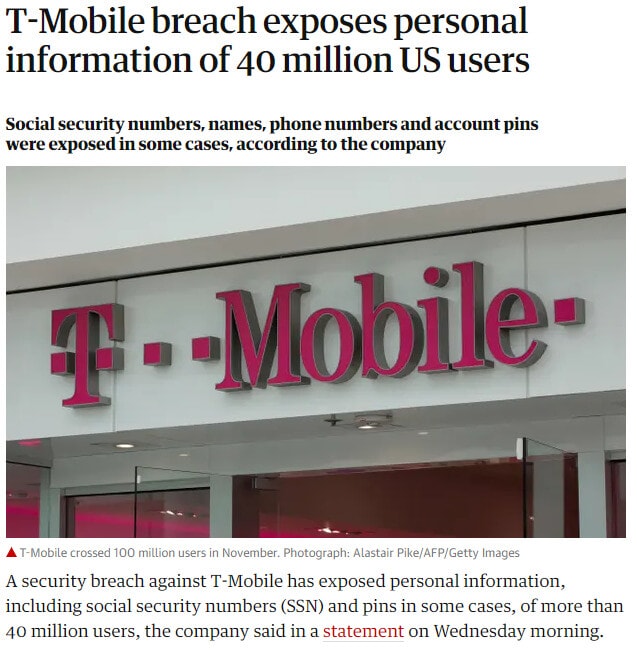Hackers recently breached the security of communications company T-Mobile. The hack has affected over 40 million people, exposing their Social Security Numbers (SSN) and, in some cases, their account PINs. So if you’re a T-Mobile customer, how can you be sure your data is safe? This article will tell you what has happened and how you should respond to the T-Mobile Data Breach.
T-Mobile Data Breach: What Happened?
T-Mobile discovered the breach when hackers started to sell T-Mobile customers’ user data on a dark web forum. The hackers claimed to have over 100 million users’ private data when they spoke to Vice on Sunday, 15th August. In response, T-Mobile began an investigation and closed the vulnerability on Monday, confirming the hack but not revealing the scope of the damage. By Wednesday, 18th August, T-Mobile confirmed that a breach of over 40 million users’ data had taken place.
According to several sources, including the hackers themselves, the breach includes SSNs as well as driver’s licenses. In some cases, the data may also include account PINs as well. This breach has affected current, past, and potential customers of T-Mobile.
What’s the Danger?

The data hackers have stolen in this breach could cause serious harm in the real world. SSNs are a key component in identity theft, and when accompanied by a driver’s license, could be used to apply for everything from loans to credit cards. If you’re a current or former customer of T-Mobile, there is a chance hackers have your information.
Current customers of T-Mobile are also in danger. Hackers also accessed the account PINs of 7.8 Million current customers. These pins are used to enter an account, which leads to the ability to change and access personal details. Hackers who have these PINs could potentially gain access to your mobile number for spoofing and other scams.
What Should I Do About the T-Mobile Data Breach?
If you’re a victim of the T-Mobile Data Breach, the first thing you should do is changing your account PIN. You should do this even if you’re not a current customer. Although it’s not believed that hackers compromised older PINs, it is better to take precautions. Log into your T-Mobile account, and follow the instruction on their support page to change your PIN.
Another step you can take is to visit T-Mobile’s page set up for victims of the breach. The company is offering two years of free McAfee identity protection to help mitigate some of the damage done by the breach. If you were affected, follow the links on the page to claim your free two-year protection plan.
If a hacker has already used your SSN to steal your identity, several options are open to you. The United States government will sometimes replace an SSN if you can prove the ID theft badly damages you. You can find more information at the SSA website.
Please Note: Changing your SSN should always be a last resort. A new SSN can cause problems with credit and various other aspects of your life. Ensure there is no other recourse left to you before you take this step.
Other Steps to Protect Yourself in the Future

The T-Mobile data breach should be a warning sign that data breaches are serious and dangerous. However, there are some steps you can take to further protect yourself against breaches in the future.
Delete Old Data
Most companies offer a service to completely remove all data about a customer once you leave their service. Once you’re done using a service, such as T-Mobile, you should request that all your data be removed from their servers. This prevents your data from being forgotten about and eventually becoming caught up in a data breach.
Limit the Data You Give Out
In some cases, giving out your data is unavoidable. For example, companies use important information, such as your SSN, to perform credit checks and other vital services. However, if providing a company with information is optional, you should always opt out of giving the information if you can.
Invest in Personal Protection
If you’re worried about your online safety, there are several options you can take to protect yourself. For example, high-value targets can hire one of our personal digital security managers to protect them from hacking around the clock. You could also invest in identity theft protection, such as those services offered by McAfee.
Featured image by r.classen from Shutterstock.com